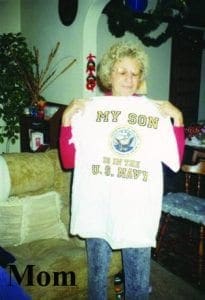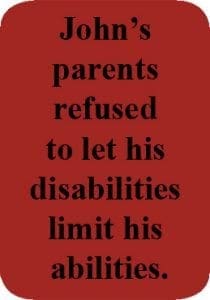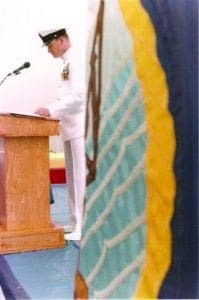Real Life with John Quinn

How John W. Quinn’s Parents’ Attitude about His Disability Created a Success Story.
In John W. Quinns’s autobiography, Someone Like Me: An Unlikely Story of Challenge and Triumph Over Cerebral Palsy (2010, History Publishing Company), he credits the way his parents approached his diagnosis by giving him the determination to overcome daily obstacles and successfully serve in the United States Navy for twenty years. His story is not just one of inspiration, but also one that gives insight into the influence parents of Special Needs children have on their child’s self esteem and future independence.
“My Disability Was Never the Focus in Our Home”
When John was diagnosed with Cerebral Palsy at the age of 4, his father made it very clear that his son would not be labeled “handicapped.” John believes that his parents accepted his diagnosis, but focused on his quality of life rather than a medical term because that’s where they wanted him to focus. This was not the typical 1970’s perspective of disability.
“I don’t remember the word limitation being used in my house. I remember just the opposite. My parents constantly told me that I could do just about anything that I put my mind to. They were trying to instill a mindset in me of determination, perseverance and hard work.”
John was never wheelchair bound or dependent upon others for his self care. However, Cerebral Palsy affected his gait, balance, reflex, posture, and vision. Corrective devices and regular Physical Therapy were used since early childhood. Yet discussion of John’s differences was not permitted in the Quinn household.
“We just did what was required and acted like wearing an eye patch or orthopedic shoes was as normal as brushing your teeth.”
Knowledge is Power
John recalls becoming aware of his CP diagnosis sometime during his elementary school years. When asked how he felt when he learned there was a name behind his physical, academic, and social struggles, John replied,
“My folks never wanted me to use the fact that I have cerebral palsy as an excuse for not trying my best in life. Telling me in a formal manner would not have made any impact in my life.”
John supports his parents’ decision to treat the effects of Cerebral Palsy without treating him any differently than his seven siblings. Despite his positive words about the way his parents helped form his character, he supports being more open when it comes to discussing a diagnosis and what it means to your child:
“I believe that knowledge is power and that a parent opportunity so that the child has a full understanding of their situation going forward. I also believe that parents should immediately lay out a plan of action (of steps) that are going to be taken to help the child.”
Teaching Families the True Meaning of Potential
John is currently retired from the Navy. He is writing and speaking publically as a self-advocate. His lifelong friend, Phil Freeman, now a middle school Principal, realized that John has something to teach children and their parents about assuming that disabled is code for unable. He has introduced John to several of his students and their families, invited John to speak to his school, and students have even written reports about John’s life and accomplishments. Trevor, a young man with Cerebral Palsy, was the first student that Phil introduced to John. Trevor’s parents needed to hear a success story as much as Trevor did.
“When I first met Trevor, his twin brother, Spencer, and his parents, the boys were about to enter the middle school where I am principal. Trevor’s parents were concerned, as most parents are, about the boys’ transition to middle school. When they informed me of Trevor’s disability, I thought it might put their mind at rest if I told them that Trevor sounded quite a bit like my best friend, John.
I tried to tell them about John’s determination to prove his independence by taking on all challenges. They were excited at the opportunity to meet an adult with CP and begin to gain an understanding of both the roadblocks and the possibilities facing Trevor. For Trevor, it was the first time he met an adult “like him.” His parents have told me that meeting John changed their outlook about Trevor’s future.
Since that time, I have introduced John to many families. He has opened their eyes through his directness and honesty about his life with CP while allowing them to ask the questions most find inappropriate to ask of someone with a disability.”
Hiding his C.P. from the U.S. Navy for twenty years meant that John had to keep the focus on the quality of his work and his character to draw attention away from his physical differences. This came naturally to someone whose parents refused to let his disabilities limit his abilities. Today, John continues to share his story and will be featured in an upcoming Cohesion Project documentary as one of several men with Cerebral Palsy who challenge society’s perception of “disabled.”
John and modern day professionals understand that it is possible to talk openly about a Special Needs diagnosis without creating a label that limits independence and future success. Forty plus years ago, his parents didn’t have the supportive resources available today. They did have instincts that they trusted; a strong work ethic, and a commitment to raising an adult who believed in himself. Their faith in John’s abilities were ahead of their time and gave one man the foundation needed for an independent, successful, and inspirational life.![]()
Related Articles
Dreams Made True: New Wonders for Walking
Anara Midgett is a Registered Nurse who first experienced life on the “other side” of the incubator when her daughter Clara was born at 26 weeks. Anara blogs at able2able…Your Special Needs Resource Directory.
You May Also Like These Success Stories
- Cody Breaking the Tape: How Disabilities Didn’t Stop Him in Life
- See How Cody’s Parents Learned How to be His Greatest Advocate…
- A Story of Inspiration: How Vernon Changed My Perception of Disability
- Proud Moments: Matthew Shifrin Inspiring Lego for the Blind
- Why Using a Wheelchair Is the Opposite of Giving Up
- Real Moms Share: Joshua’s Success Story
- Autistic Teen Finds Inner Voice
- Proud Moments: Go Patricia; Go Knights!
- Joshua Walker: Life, Learning and Making Progress
- Celebrities with Disabilities that Turned their Dreams into Attainable Goals
- How to Find Your Special Child’s Spark?
- Acceptance is the Key
This post originally appeared on our July/August 2011 Magazine







